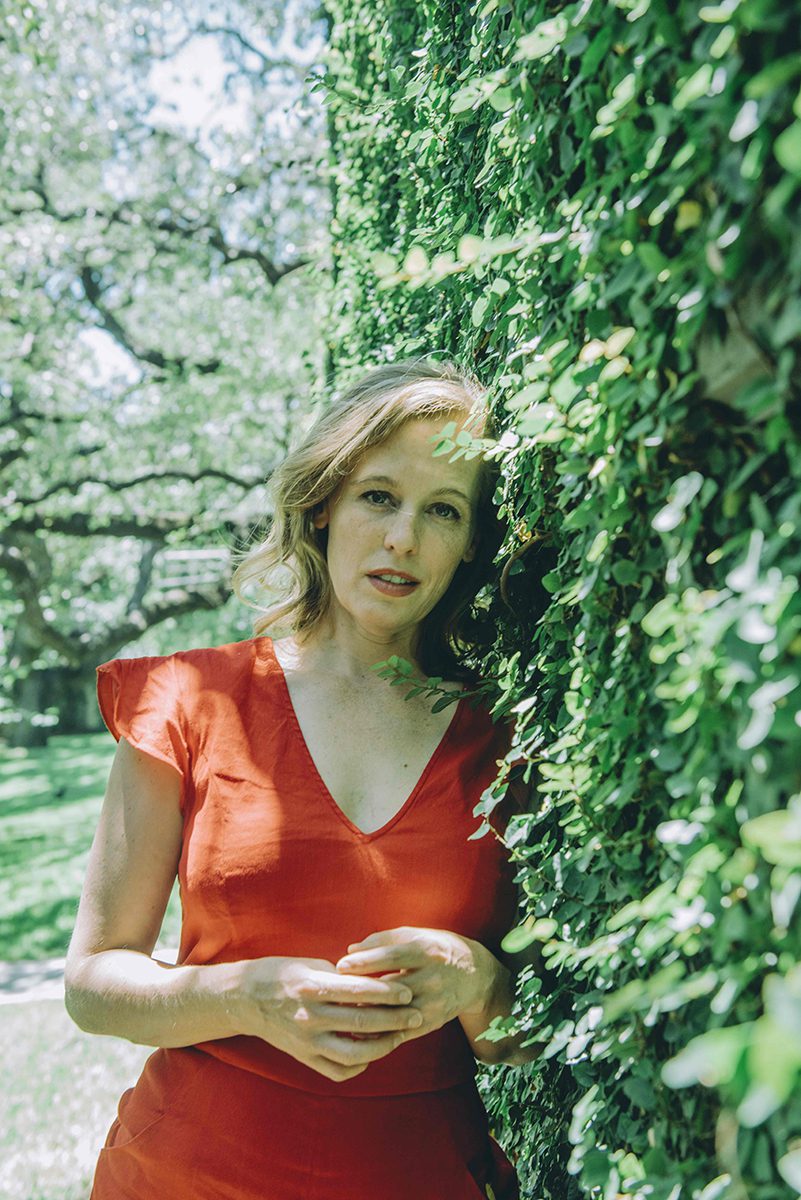
Interview: Tift Merritt – Keeping Me Happy
The irrepressible singer reflects on turning a corner, getting away from it all and climbing a tree, writes Johnny Sharp.

“Ha ha ha heeeee!” Is Tift Merritt drunk? Or possibly a little high? In all likelihood, the singer-songwriter is neither of those things, since it’s only 4pm in New York as she answers Country Music’s phone call. But she does sound positively giddy with excitement as she talks about her first solo record for over four years, Stitch Of The World.
Peals of shrieking laughter punctuate our chat as she discusses her 15-year recording career, the recent changes in her life and the break from solo performing that helped her regroup, refresh and make arguably her strongest album to date.
After complimenting our name, we ask about her own, original moniker. “It’s a family name,” she replies. “They started naming all the other family members Tift, and I’m actually the only female Tift. I’m not sure that’s what they were thinking when I was born – ha ha!”
Collaborative Approach
Names, like genres, are something you may be able to disown, but it’s hard to shake them off entirely. And while Merritt’s new album draws on blues, folk and singer-songwriter influences, it’s shot through with an unmistakably country feel, whether in the streaks of pedal steel, the Southern twang in her voice or the emotionally upfront lyrical approach. And the woman herself is only too happy to be seen as part of that musical lineage.
“I’m proud to be part of the country tradition. I’ve always loved all kinds of roots music, and I love traditional storytelling in song. I don’t like being compared to country pop, though – I identify with the traditional country music people like Kitty Wells and Emmylou Harris – they’re among my heroes along with Carole King, Joni Mitchell and Billie Holliday. But I think genres are usually fingers of the same hand, so you take any of those influences away from me and it’d be like removing a finger. It’s all part of me.”
This is a woman who is nothing if not versatile, however, and after she finished touring 2012’s Traveling Alone, her next project was a collaboration with classical pianist Simone Dinnerstein, a collection of small-hours piano and guitar pieces they called Night. It’s a delicately beautiful,intoxicating listen that’s well worth checking out for any Merritt fans.
She followed that up by touring with off-kilter singer-songwriter Andrew Bird, a long-term collaborator and friend, as part of his band Hands Of Glory. Was it fun to share the burden with other musicians for once?
“Absolutely – I really enjoyed that deeper collaboration,” she says. “I really love being in bands playing with other people in a supporting role, and it also reinforced some of the things I do myself – every time you’re having these experiences with other people, it’s going into your own personal well of things to draw from.”
Leaping Off The Map
As it turned out, she had plenty of personal food for thought anyway. By the end of 2014 she was about to turn 40, and a year previously she had split with husband and band drummer Zeke Hutchins. She took a few months out to write songs in a cabin in California and a friend’s ranch in Marfa, West Texas.
“It was a leap off whatever map I’d written for myself,” she says, “and I think there’s some trial and error in all that. But I had to step away. With all the projects and tour dates, I was turning 40 and my life had taken unexpected turns, and I needed to sort through it without any other distractions.”
Retreating to rural solitude to summon the creative muse has become a popular approach for songwriters, and you wonder if the ‘cabin’ of which musicians speak is basically a big fat studio that just happens to be out in the sticks. In Merritt’s case, though, it was part buswoman’s holiday, part artist’s retreat.

“I was in Big Sur, a beautiful part of California,” she says. “It was my 40th birthday present to myself! It was definitely a retreat, getting out of the grind of regular life. For me, part of writing is looking at things in a different way, and sometimes the physical experience of doing that can prompt the mental approach to doing that.
“California is so beautiful, but there’s also an aspect where I have a writing routine, which I just don’t get while I’m on the road. I was going hiking every afternoon, and that’s how the lyrics for Heartache Is An Uphill Climb came about – because I had had my ass kicked by a real mountain in California! Ha ha!”
Walking The Line
Merritt’s routine revolved around writing in the mornings and then hiking in the afternoons, or for however long it took to get to the end of the road.
“I always find walking is a great way to think,” she says. “Sitting at a desk there’s this self-imposed pressure to do something important, whereas being physical is a great way to free your mind. I’d be singing things into my phone because ideas would be coming to me as I walked. I did a similar thing when I lived in Paris for a while a few years ago, and then I tried it again a few years later after they had installed all the city bikes, and it was such a different experience because the pace of the city bike was so much faster.
You can only go so fast when you’re walking and you really can take in your surroundings and really notice. So I think walking and hiking really worked for me – and these were long hikes – I would come home at the end and go to sleep!”
Another song that came from that California trip was the title track of the new album, Stitch Of The World. “As it weaves through your heart, try not to be scared,” she sings as humanity intertwines with the natural world.
“I was sitting on a cliff and the land around me looked like a quilt, so beautiful, as if somebody had stitched these pieces of the tree and the sky together. I just started to think about this stitch holding all the pieces of the world together. For me, if you’re stitched into the world it hurts sometimes, and it can feel restricting, but you have to participate, you have to go with it – you have to participate fully to become a part of the world.
“I was also thinking about the unseen seams that bind us, and the idea that just as with sewing, you can’t pull too hard because they can knot or they can fray. You have to really go gently as much as you’re tempted to go wholeheartedly, and that really seemed like the right metaphor to describe where I’d come from and how I wanted to proceed.
“You want to be part of that cloth and that means you also know you can’t go swinging left and right tearing things, but you also want to do it in a really open-hearted way that allows you to be free.”
Meanwhile, chilling out at the Texan ranch was equally rewarding. “The new experience was just sitting still, because I’d been travelling so much, then going out and experiencing nature, then getting up every morning and having this writing experience. It’s a whole different way of focusing on the world around you.”
It was in Texas that Merritt shot the photo for the album sleeve, which sees her barefoot, in flares, sat in a giant tree with a large drum beside her. It’s an image that would have fit perfectly on the cover of a singer-songwriter’s album of mellow wistfulness from 1971.
“Ha ha heeee! Yeah, well it’s very much a singer-songwriter record in that you want to feel personally connected to the listener. But it also has that bohemian feel because I spent a lot of time in California, West Texas and New York.”
Hope and Hinderance
The album opens with a more gritty, bluesy musical style than that image suggests, however. Merritt has admitted that Dusty Old Man was heavily inspired by listening to Bonnie Raitt’s first album, and its laid-back boogie envelopes a tale of an errant lover who is “mean as a snake”. Autobiographical stuff from a turbulent romantic history of late? Merritt’s not telling.
“I don’t always want to write songs as a diary entry. But it does have to be an image or a line of singing that’s interesting enough that you can throw yourself behind it personally. My writing usually comes from questions that are personal to me, but I can write about other stories, places, objects, historical events. But you draw them close enough to you that they become yours. Even if you’re speaking in a third-person voice.
“That said, I don’t really see the point of obscuring myself personally in my music. I don’t really feel like hiding, because the act of making music is trying to communicate and trying to reveal. I’m not trying to say this is not about my life, or be oblique, I’m trying to be real and trying to give of myself, I just don’t want to do it in a way that feels… yucky to anyone. Ha ha heeee!”

Though we’re not sure how much the wiser we are for all that, we can certainly say there’s nothing remotely ‘yucky’ about Dusty Old Man or any other song on the album. And while the textures on Stitch Of The World can be sweet at times, particularly when her brittle North Carolina tones are offset by the harmonies of producer Sam Beam (from Iron & Wine) on the album’s final three tracks, there’s a gently uplifting positivity and mature optimism running through the songs that always sounds worldly wise rather than naïve or twee.
Much of the album’s tone is a stoic sense of hope and positivity. One track that stands out is Merritt’s musical arrangement of the Raymond Carver poem My Boat, inspired by a heartfelt reaction to media coverage of refugees drowning in the Mediterranean a couple of years back.
“My first feeling is that it’s a really positive and inclusive song,” she says. “On the news at the time, there were a lot of boats sinking with refugees and there was this big debate on what to do about them. And for me it was like, you can’t deny someone when they need refuge like that. And then it became something different when American politics became such a strange and un-inclusive place, and that made me want to sing this song even more.”
Power of Positivity
Things seem to have turned out pretty well on a personal level for Ms Merritt, as she fell pregnant soon after writing the record, and gave birth to her first child, Jean, early in 2016.
So the troubles that drove her to write Stitch Of The World would seem to be behind her. But while such domestic joy sometimes seems to produce rather less edgy, emotionally wrought music for some artists, Merritt immediately dismisses my mention of the old cliché, ‘happiness writes white’.
“It’s far more complicated than that. We do tend to find our grit and have to use our depth when we are pushed into something not so good, but there’s also an experience of pain and unhappiness that is completely flat and not productive and not interesting.
“I think for me, joy is somehow connected to substance, so it’s not like I write birthday-cake happy – for me, joy has enough oomph to take in the realities rather than cut them off at the seams. I think that’s a powerful place to create from, maybe the most powerful place.
“But there’s a lot of different colours to draw on in life, and my experience is that you don’t need to go and seek out sorrow to have substance, because you will have some in your life if you’re awake to it.”
15 years since her debut, Tift Merritt seems to have come of age on Stitch Of The World. No longer regarded as the rising star of tomorrow, she’s happily established a loyal and knowledgeable following in her own right that allows her to do her own thing. As the positivity of Love Soldiers On and Wait For Me shows, there’s always light at the end of the proverbial tunnel, which is something we can all believe in.




